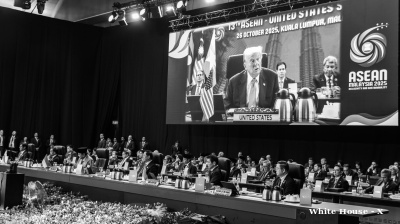On September 25, China conducted a significant test of its intercontinental ballistic missile (ICBM) capabilities, launching a missile with a dummy warhead into the Pacific Ocean. This rare event, described by the People’s Liberation Army Rocket Force as part of a routine training exercise, is likely to heighten international concerns regarding China’s nuclear arsenal and military posture, as reported by Reuters.
The missile was launched at 8:44 a.m. Beijing time and reportedly fell into expected sea areas, as confirmed by the Chinese defence ministry. While officials insisted that the launch was not aimed at any specific country, the action underscores China's ongoing efforts to modernise its military forces, particularly its nuclear capabilities. Notably, China informed the United States ahead of the launch, with a Pentagon spokesperson describing this communication as a positive step towards reducing the risks of misinterpretation.
Analysts have noted that such long-range missile tests into the sea are uncommon for China, which typically conducts these trials in more remote areas. The current launch may indicate a shift in strategy, reflecting both confidence and a need to demonstrate military readiness amid recent scrutiny over corruption within the Rocket Force. Security expert Alexander Neill pointed out that this demonstration serves to reinforce China's commitment to maintaining an effective nuclear deterrent while simultaneously signalling a willingness to engage in military diplomacy with the United States.
China's rapid nuclear build-up has drawn attention, especially as the Pentagon reported last year that Beijing possesses over 500 operational nuclear warheads, with projections suggesting that number could exceed 1,000 by 2030. The Chinese military has been working to develop a triad of delivery systems capable of launching nuclear weapons from land, sea, and air, although Beijing maintains a "no first use" policy regarding its nuclear arsenal.
The increasing military activity in the region has also caught the attention of Taiwan, which reported a rise in Chinese military aircraft operations in the vicinity of the island. Taiwan’s defence ministry observed 23 Chinese military planes, including J-16 fighters and drones, conducting long-range missions nearby, further escalating tensions in an already volatile region.
While China seeks to assert its military capabilities, it faces scrutiny over the transparency of its nuclear strategy. The Pentagon has called for a more structured notification process for ballistic missile launches, emphasising the importance of addressing the risks associated with China’s expanding nuclear stockpile. As regional dynamics evolve, the balance of power in East Asia remains delicately poised, with the implications of China's actions likely to reverberate across the international stage.
News

Milei celebrates resounding victory in Argentina's midterm elections
Argentine President Javier Milei scored a major win for his La Libertad Avanza (LLA) party in Argentina's October 26 midterm legislative elections, as the party obtained approximately 40.84% of the nationwide vote with 99.14% of the votes counted.

Zelenskiy accuses China of aiding Russia’s war effort through industrial and military support
Ukrainian President Volodymyr Zelenskiy accused China of materially supporting Russia’s military-industrial complex, providing key technologies and resources that have enabled Moscow to sustain and scale its war effort against Ukraine.

US Treasury Secretary Bessent blasts “Russian propagandist” special envoy Dmitriev in Washington PR debacle
A trip to Washington by the Kremlin’s special business envoy Kirill Dmitriev days after the US imposed new oil sanctions turned into a debacle after US Treasury Secretary Scott Bessent blasted him as a “Russian propagandist.”

Trump pledges enduring support for Southeast Asia as new trade deals signed
During his visit to Southeast Asia, US President Donald Trump declared that Washington would remain a steadfast ally to the region, as he signed a series of trade agreements with four ASEAN member states.




